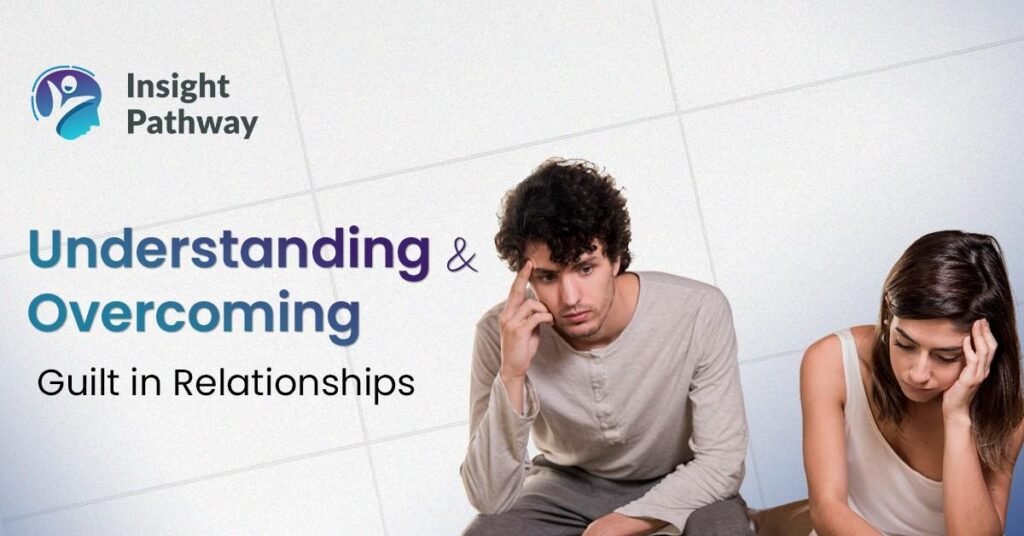What Is Relationship Guilt?
Feeling guilty in a relationship is a natural human emotion that often arises when someone believes they’ve hurt, disappointed, or let down their partner. This sense of regret can either motivate growth or, if left unchecked, create emotional imbalance and dependency.
A small amount of guilt can foster empathy and accountability. But when it becomes chronic, it harms emotional control, damages self-esteem, and weakens healthy boundaries. Many people caught in this cycle over-apologize, take on too much blame, or hide their true feelings to avoid conflict or rejection.
Primary Causes of Guilt in Relationships

Understanding what triggers persistent guilt helps you recognize emotional patterns before they damage connection and trust.
1. Emotional Control and Self-Blame
When someone struggles with emotional control, guilt tends to spiral. They might believe they should always keep the peace, even when they aren’t responsible for the issue. This leads to emotional suppression and self-blame.
Developing stronger emotional balance allows you to recognize guilt without being consumed by it. It’s about responding with empathy instead of reacting out of fear.
2. Low Self-Esteem and Unworthiness
Low self-esteem often feeds excessive guilt. When individuals doubt their value, they may feel undeserving of love or forgiveness, leading to people-pleasing or emotional withdrawal.
Rebuilding self-worth requires self-compassion, honest reflection, and positive self-talk. The stronger your self-esteem, the easier it becomes to process guilt with perspective rather than punishment.
3. Lack of Healthy Boundaries
Weak or inconsistent healthy boundaries create a breeding ground for guilt. When someone consistently sacrifices their needs to please others, resentment and fatigue soon follow.
Boundaries aren’t selfish they’re acts of self-respect. By communicating openly about limits, you preserve both connection and individuality in your relationships.
4. Dependency and Fear of Abandonment
Excessive dependency often amplifies guilt. When emotional or financial reliance is strong, one partner may avoid expressing their true feelings out of fear of rejection or conflict.
Building independence through self-awareness, hobbies, and personal growth helps reduce guilt-driven behavior and restores balance between partners.
The Emotional Toll of Unresolved Guilt
Left unchecked, emotional guilt drains energy and confidence. It traps you in a pattern of over-responsibility and anxiety, eroding intimacy and joy.
You might notice signs like:
-
Constantly apologizing, even for small things
-
Feeling accountable for your partner’s emotions
-
Avoiding difficult conversations
-
Over-giving to maintain peace
-
Feeling shame when asserting your needs
When guilt dominates your emotions, clarity fades. Instead of authentic connection, fear and self-doubt start running the relationship.
Breaking the Cycle of Relationship Guilt

Overcoming guilt doesn’t mean avoiding responsibility it means embracing self-awareness and compassion. Healing starts when you acknowledge emotions without letting them control you.
1. Recognize and Accept What You Feel
Guilt is a message, not a verdict. When it arises, pause and ask:
-
“Is this guilt based on facts or fear?”
-
“Am I responsible for what happened, or am I taking on too much?”
Self-reflection helps you regain emotional control and prevents guilt from becoming a permanent emotional burden.
2. Strengthen Self-Esteem
When you value yourself, guilt loses its grip. Affirmations and self-care practices like journaling, mindfulness, or therapy can rebuild confidence and resilience.
Try reminding yourself:
-
“I can make mistakes and still be worthy.”
-
“I’m allowed to set boundaries without feeling guilty.”
-
“I can love others without abandoning myself.”
A healthy sense of self-worth is the antidote to emotional over-responsibility.
3. Rebuild Healthy Boundaries
Setting healthy boundaries is a powerful way to reduce guilt. Be clear, respectful, and assertive about your emotional needs.
Examples include:
-
“I need a little time to process before we talk.”
-
“I want to help, but I also need space to recharge.”
Boundaries build respect and prevent one-sided emotional dynamics.
4. Practice Emotional Regulation
Developing emotional control means noticing when guilt takes over and intentionally calming your response. Deep breathing, meditation, and grounding techniques help prevent impulsive reactions.
Instead of internalizing blame, take a step back, assess, and choose your response with awareness.
5. Cultivate Independence
Reducing dependency encourages balanced love. Pursue your own hobbies, friendships, and goals so that your happiness doesn’t rely entirely on your partner.
Healthy relationships thrive when two emotionally strong individuals support each other, not when one person constantly compensates for the other’s emotions.
How Guilt Affects Relationship Dynamics

Relationship guilt changes communication patterns and emotional energy. Often, one partner becomes the “fixer,” while the other grows accustomed to being reassured.
Over time, this imbalance can cause:
-
Emotional fatigue and burnout
-
Reduced authenticity and openness
-
Passive-aggressive reactions
-
Resentment due to uneven effort
Recognizing these patterns helps partners shift from guilt-based behavior to mutual understanding and growth.
Healing Through Forgiveness and Connection
Forgiveness, both of self and others, is essential for healing. It doesn’t erase what happened, but it releases the emotional grip of guilt.
Partners can practice open communication and even explore couple therapy for emotional healing to understand each other’s feelings more deeply and rebuild trust.
-
Express guilt honestly, without dramatizing it.
-
Validate each other’s feelings instead of assigning blame.
-
Commit to small acts of rebuilding trust.
Shared empathy transforms guilt into growth, fostering emotional control and genuine intimacy.
Long-Term Growth: From Guilt to Empowerment

Healing from guilt is a lifelong process of emotional awareness. It’s about learning rather than reliving the same pain.
To sustain emotional well-being:
-
Maintain daily self-awareness and reflection
-
Honor your healthy boundaries consistently
-
Continue building self-esteem through growth
-
Keep emotional control during conflict by staying calm and grounded
-
Reduce dependency through independence and shared trust
When guilt fades, peace and confidence take its place. What was once emotional heaviness becomes a foundation for understanding, maturity, and lasting love.
Final Thoughts
Relationship guilt can either damage connection or deepen understanding depending on how you respond to it. When faced consciously, this feeling becomes a gentle guide that teaches you empathy, patience, and self-respect.
The goal isn’t to suppress emotional guilt, but to understand its message: you can care deeply without losing your sense of self.




